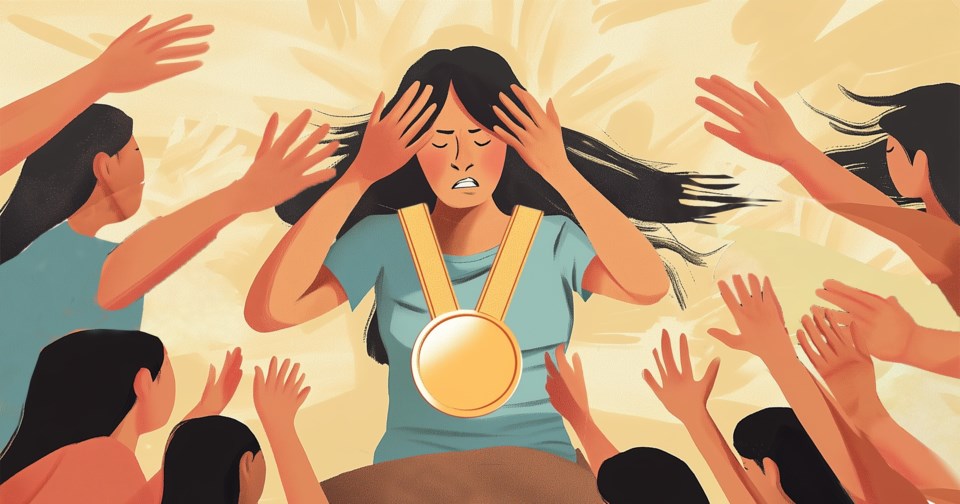I'm lying awake at 3 a.m., thinking about “Anonymous Member,” the mother of two school-aged kids in our community who posted in the parents forum: “I’ve started and stopped this post so many times. But I’m getting to a point where I just don’t know what to do, and doing nothing is not working.” She is struggling—locking herself in her room the moment her partner gets home, desperate for breathing room from her kids, who don’t stop touching, needing, overwhelming her.
I hate the idea that someone finally expressed a need for help into the void of Facebook and might get only an echo back—instead of a hug, a meal train, a massage, or a weekend away with girlfriends. So my brain obsesses over this unknown human, as if my insomnia could somehow help.
It’s not your fault, I want to say, shaking her by imaginary shoulders that don’t want to be draped in children’s neediness for just five minutes, please. We live in a system that has devalued caregiving for thousands of years—a system called patriarchy, where power is centred as the ultimate value, leaving parenting and care work drained and unsupported.
The opposite of patriarchy isn’t matriarchy per se—those words can trip us up—but a system where care is centred. Where tending and attending to others and the planet is honoured, supported and valued. Where care is reciprocated, nurtured and fed. Where everything that supports caregiving is prioritized.
But that’s not the system we have. Ours is about power, extraction and profit. If you want care, you pay for it. And what exists—childcare, food banks, nonprofits, church programs—are usually band-aids trying to stop the dam from bursting.
So what I want to say to Anonymous Member with all the fire of my 3 a.m. brain is this: not flourishing as the primary caregiver in late-stage capitalism is not a personal failing. It’s not YOUR nervous system. It’s the entire system. Your short-circuiting is a signal that the larger system is broken. The nuclear family, treading water in an isolated house under an insane mortgage, is fundamentally depleting—especially for the one spending the most time with the kids.
I’d just shown my partner a Substack post by one of my favourite writers on patriarchy, Celeste Davis (https://celestemdavis.substack.com/p/not-believing-women), which may be why the Insomnia Fairy selected this concern to torment me with. Davis had shared a graph showing what mothers actually wanted for Mother’s Day. Just 3 per cent wanted a physical gift—the same number as those who wanted “Free Palestine.” What 47 per cent wanted was alone time.
Just to be left alone.
Meanwhile, down in the emerging state of Gilead, under the Trump Crime Syndicate, they’re offering medals for women who have six or more babies. Davis skewers the absurdity: “Clearly, someone loves medals. And it’s not the mothers. I don’t know one woman who would think, ‘You know what would make me have more kids? A medal.’”
What do mothers actually want? According to Davis’ round-up of surveys: paid parental leave, reproductive rights, climate regulation, gun control, affordable child care, mental health support. A network of care. An ecosystem of survivability.
“My family lives far away and we don’t make enough to afford babysitters regularly or therapy,” wrote Anonymous Member. “I’ve got friends with kids the same age, but we’re all so busy all the time.”
At 4:30 a.m., I logged in, preparing to type out a screed, when I saw her post had already received 60 supportive responses and 35 offers of empathy. “I hear you.” “You’re not alone.” “PM me if you want to talk.”
When you’re deep in the care trenches, it’s vital to receive care, too. Children’s development literally depends on the health and flourishing of their caregivers. And this community does care, as that wave of support shows. But it also shows how many of us are DIY-ing survival strategies under a fundamentally hostile economic system.
An empathetic comment or earplug tip isn’t a substitute for networks of mutual aid or system-wide support that gives slack to our overloaded nervous systems.
The most important work in this world—the nurturing of human life—is the least valued, the least visible, the least supported.
We need a care restoration project. A community-wide effort to seed ecosystems of care that allow everyone to flourish. Whoever starts a project like that? That’s who truly deserves a medal.




